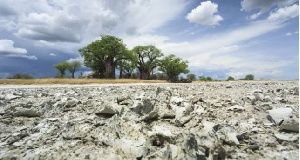Origin of modern humans ‘traced to Botswana’

Scientists say they’ve pinpointed the homeland of all humans alive today to a region south of the Zambesi River.
The area is now dominated by salt pans, but was once home to an enormous lake, which may have been our ancestral heartland 200,000 years ago.
Our ancestors settled for 70,000 years, until the local climate changed, researchers propose.
They began to move on as fertile green corridors opened up, paving the way for future migrations out of Africa.
“It has been clear for some time that anatomically modern humans appeared in Africa roughly 200,000 years ago,” said Prof Vanessa Hayes, a geneticist at the Garvan Institute of Medical Research in Australia.
“What has been long debated is the exact location of this emergence and subsequent dispersal of our earliest ancestors.”
Prof Hayes’ conclusions have drawn scepticism from other researchers in the field, however.
Lakeland haven
The area in question is south of the Zambesi basin, in northern Botswana.
The researchers think our ancestors settled near Africa’s huge lake system, known as Lake Makgadikgadi, which is now an area of sprawling salt flats.
“It’s an extremely large area, it would have been very wet, it would have been very lush,” said Prof Hayes. “And it would have actually provided a suitable habitat for modern humans and wildlife to have lived.”
After staying there for 70,000 years, people began to move on. Shifts in rainfall across the region led to three waves of migration 130,000 and 110,000 years ago, driven by corridors of green fertile land opening up.
The first migrants ventured north-east, followed by a second wave of migrants who travelled south-west and a third population remained in the homeland until today.
This scenario is based on tracing back the human family tree using hundreds of mitochondrial DNA samples from living Africans – the scrap of DNA that passes down the maternal line from mother to child.
By combining genetics with geology and climate computer model simulations, researchers were able to paint a picture of what the African continent might have been like 200,000 years ago.
Source: bbc.com





